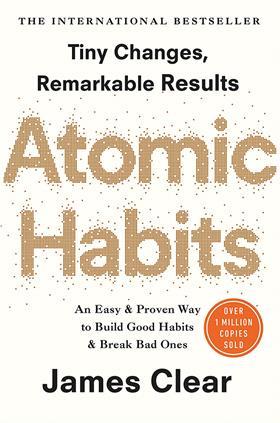Diary of a busy practitioner, juggling work and family somewhere in England
James Clear is one of those people that makes you feel ridiculously pathetic. Hit in the face with a baseball bat at college, he suffered huge brain and facial injuries. His determination to play baseball again, at a high level, meant that he was eventually named top male athlete at his university, and he also achieved the university’s highest academic medal. More specifically, he practised good habits to get there. In his book, Atomic Habits, he reflects on how it is the cumulative effect of tiny changes that will get you to your goals, not huge ones: practise good habits consistently and minimise the bad ones.

Unlike Ed Sheeran, my bad habits rarely lead to conversations with strangers I barely know. I actually love conversations with strangers, much to my children’s horror and embarrassment. But I don’t think Ed is talking about asking the waiter what he would order if he was me, or asking someone on a train about their book. Anyway, my bad habits are more eating crisps, driving on the petrol light and forgetting to take my vitamins. Yes, Ed probably is going to write his next song about me.
Atomic Habits reeled me in as I think an awful lot about being active in decision- making and not passive. I’ve discussed this before in my blogs – see, for example, my review of Digital Minimalism by Cal Newport. I don’t want to get old and realise I spent too much of my life scrolling through Twitter, a stone overweight, or too busy tidying up the house to write a book. Or not being able to afford holidays because I didn’t make packed lunches.

Clear talks about how very small changes can have a huge cumulative effect. He gives the example of the British cycling team changing a dozen small things like the cyclists’ pillows and mattresses, ensuring good hand washing to prevent illness, and painting the inside of the vans white to spot dust on the bikes more easily. This led to them going from obscurity to consistent huge success. Leading on from this, he says those very small changes usually only need to make you 1% better than your competitor to reap a much larger reward: the difference between a gold medal and not, getting a job or not, getting a good result for your client or not.
The problem, of course, is that it takes time for the small changes to do their work. It also takes time for bad habits to have a long-term effect, making the long-term effect easy to overlook. There is a lag. But there will eventually be a breakthrough moment when the effect is noticeable. The visible progress is not linear. It will seem like nothing is happening for some time, until ‘the moment’ comes where it becomes visible. A good habit (practising good file management) might eventually lead to promotion; a bad habit (leaving empty shampoo bottles in the shower) might lead to divorce. I’m just saying. It might.
Clear discusses how identity plays a role in habits. Labelling yourself as a ‘picky eater’ or ‘disorganised’ or ‘not good with IT’ entrenches the position. You’ve got to decide on the person you want to be and make it happen with small wins. Go for a jog, and then don’t wince if someone describes you as a runner. That is what you are.
Habits, he says, are formed in four steps: cue, craving, response and reward. These steps create the habit loop. You need to create the loop for good habits (by making it obvious, attractive, easy and satisfying), and break the loop in respect of bad ones (by doing the opposite).
If you want to start reading before bed, you could place your book on your pillow in the mornings, move your phone charger downstairs, and choose a book you really fancy reading. If you want to drink less coffee, put it on a high shelf and buy an interesting alternative. I know it isn’t always as easy as this, but it is necessary to understand the habit loop in order to make/break it. It isn’t all about self-control; it is also about setting yourself up for success.
For me, the biggest takeaway from the book is that you can keep trying. I accidentally broke my New Year’s resolution of not using disposable cups. But rather than give up, I am trying again. When I was a kid, if my mum accidentally broke her diet, she would go to the village shop and buy a Twix, a Mars bar, a Cadbury’s Caramel and a Twirl as ‘she might as well be hung for a sheep as a lamb’. For anyone unsure, this logic is Not Sound. Slipping up is human – getting back on track the next day is the important thing.
Atomic Habits contains a wealth of information, as does James Clear’s website. It goes into the psychology of habits while also nailing down the practicalities. Proof of purchase of the book entitles you to claim bonus chapters on parenting and business too. If getting whacked in the head by a baseball bat isn’t an excuse, then, well, I don’t have any. I’ll get some petrol on the way home.
Some facts and identities have been altered in the above article































No comments yet